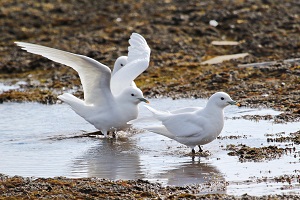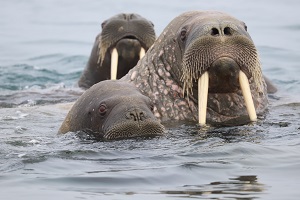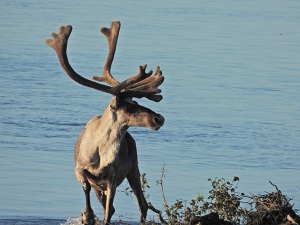Rosneft Completes Environmental Field Work 2022

Rosneft conducted three expeditions to hard-to-reach and poorly explored areas of the Russian Arctic in 2022 as part of the national Ecology project. The Company’s representatives announced this at a press conference in Moscow. Scientists studied populations of the Ivory gull, Atlantic walrus subspecies and wild reindeer this season.
Rosneft is conducting research on the conservation and monitoring of key bio-indicator species of Arctic ecosystems under an agreement with the Ministry of Natural Resources and Environment signed in 2019.  The Company and the country’s leading research institutes spent a total of over 14 months on expeditions. 200,000 photos have been captured by the installed camera traps. More than 600 biological samples were collected for laboratory analysis. Field work in 2022 was the final stage of the project. Based on the results, practical solutions will be developed to protect the environment at the Company’s licensed areas.
The Company and the country’s leading research institutes spent a total of over 14 months on expeditions. 200,000 photos have been captured by the installed camera traps. More than 600 biological samples were collected for laboratory analysis. Field work in 2022 was the final stage of the project. Based on the results, practical solutions will be developed to protect the environment at the Company’s licensed areas.
Research on the population of the Ivory Gull, a rare species of sea bird listed in the Red Book, was carried out in the northern Kara Sea on Wiese Island in 2022. In addition, 8 other nesting sites were surveyed, including Golomyany, Sredny and Domashny islands. Eight gulls were fitted with GPS trackers to identify their feeding areas. Two trackers installed in 2020 were also removed, allowing to analyse the annual movements of the birds.
 Observations of walruses in 2022 were carried out as part of the Floating University trip on the route Dixon – Franz Josef Land – Arkhangelsk. The largest rookery was found on Heiss Island. 658 individuals (previously no more than 150 were observed) stayed away from water, a behaviour never before described in the scientific literature.
Observations of walruses in 2022 were carried out as part of the Floating University trip on the route Dixon – Franz Josef Land – Arkhangelsk. The largest rookery was found on Heiss Island. 658 individuals (previously no more than 150 were observed) stayed away from water, a behaviour never before described in the scientific literature.
The wild reindeer population was surveyed in Eastern Taimyr in 2022. The length of the aerial animal counting routes exceeded 13,000 kilometres. The adjustment was based on radio beacon signals placed on the reindeer in past years.
 Earlier in 2020/21, scientists studied polar bear behaviour on the islands of the Novaya Zemlya and Franz Josef Land archipelagos as part of the project. The tasks of the expeditions included: determining the frequency of encounters between the predator, carrying out morphometric measurements, and equipping the animals with satellite transmitters to study migration routes.
Earlier in 2020/21, scientists studied polar bear behaviour on the islands of the Novaya Zemlya and Franz Josef Land archipelagos as part of the project. The tasks of the expeditions included: determining the frequency of encounters between the predator, carrying out morphometric measurements, and equipping the animals with satellite transmitters to study migration routes.
The data collected during Rosneft expeditions will update the current understanding on the habitats of the species under study.
Rosneft
Information Division
October 20, 2022